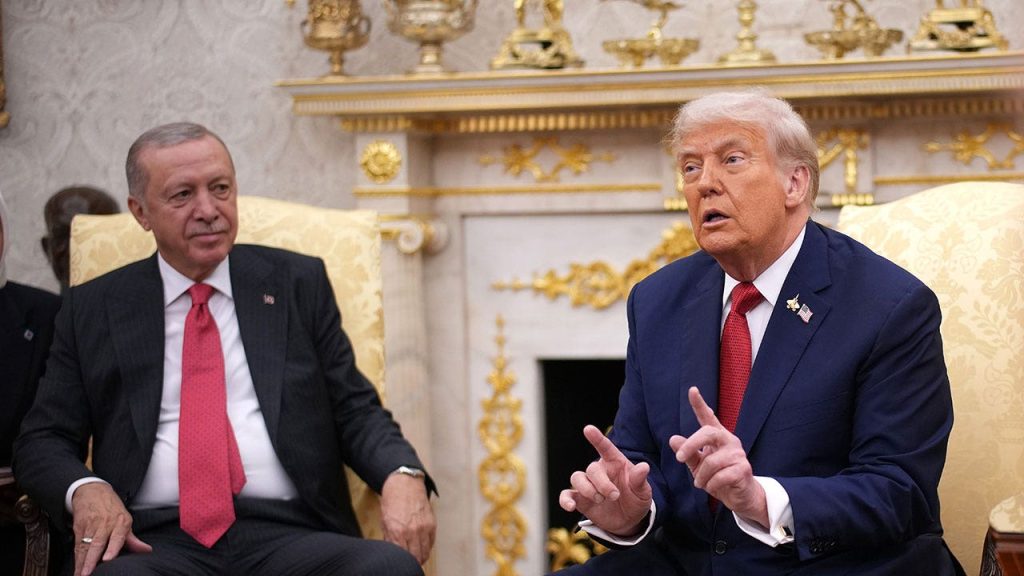Trump Urges Turkey’s Erdoğan to Cut Russian Oil Purchases amid Ukraine War
In an Oval Office meeting that highlighted the complex interplay of geopolitics, defense, and trade, President Donald Trump encouraged Turkish President Recep Tayyip Erdoğan to leverage his influence to help end Russia’s war in Ukraine. The discussion, which took place against the backdrop of Trump’s growing insistence that NATO allies cease Russian oil purchases, revealed the delicate balance of international relationships in the face of ongoing conflict. “I think he could have a big influence if he wants to,” Trump remarked while sitting beside Erdoğan. “Right now, he’s very neutral. He likes being neutral. So do I, like being neutral.” However, the American president made clear his position on what would constitute meaningful action: “But he’s somebody that if he got involved, the best thing he could do is not buy oil and gas from Russia.”
The meeting’s agenda centered primarily on “war” and “trade,” with Trump taking a firm stance against Russia’s continued military actions. “I’d like to have him stop buying any oil from Russia. While Russia continues this rampage against Ukraine,” Trump stated emphatically, adding that the situation was “disgraceful” and that “Putin ought to stop.” This rhetoric aligns with Trump’s recent shift in tone regarding the Ukraine conflict, though some experts remain cautious about whether this verbal positioning will translate into concrete actions against Putin. Turkey currently stands as Russia’s third-largest oil importer, behind only India and China, making Erdoğan’s cooperation potentially significant in economic pressure against Moscow.
The conversation also ventured into defense procurement territory, with Erdoğan expressing interest in purchasing American F-35 fighter jets. This request comes with considerable complexity, as the U.S. previously barred Turkey from acquiring these advanced aircraft after Ankara purchased a Russian air defense system, raising concerns about Moscow potentially gaining access to sensitive American technology. Trump remained noncommittal about lifting this specific ban but suggested that military equipment sales could be part of broader negotiations. “We’re talking about that very seriously,” he noted. “He needs certain things, and we need certain things, and we’re going to come to a conclusion by the end of the day.”
What makes this diplomatic exchange particularly intriguing is Turkey’s unique position in the current geopolitical landscape. Unlike India, which has already faced secondary tariffs for its Russian oil imports, and China, with whom negotiations remain ongoing, Turkey has thus far avoided Trump’s secondary tariff threats. This suggests a strategic calculus at play, possibly using the F-16 fighter jet negotiations as leverage for broader concessions. Trump indicated optimism about the fighter jet discussions, saying the U.S. and Turkey were “in great shape” regarding a possible deal on F-16s, though he was less clear about whether this goodwill extended to the more advanced F-35s that Turkey desires.
The meeting underscores Trump’s evolving approach to the Ukraine conflict, which has increasingly focused on economic pressure as a primary tool. By targeting Russian oil sales, Trump appears to be pursuing a strategy of strangling Russia’s war funding capabilities rather than direct military intervention. This approach places significant importance on the cooperation of countries like Turkey, which maintain substantial trade relationships with Russia. The effectiveness of this strategy depends heavily on convincing key partners like Erdoğan to make economic sacrifices in service of a broader geopolitical goal, a delicate diplomatic dance that balances immediate national interests against longer-term international stability.
As the two leaders worked through their agenda, the complexities of modern international relations were on full display. The intersection of military technology transfers, energy dependencies, trade relationships, and responses to armed conflict created a multidimensional negotiating environment. Whether this meeting will result in meaningful changes to Turkey’s Russian oil purchases remains to be seen, but it clearly demonstrates Trump’s current diplomatic priority: building an economic coalition against Russia’s war efforts by persuading allies that their continued energy purchases from Moscow effectively mean “funding the war against themselves.” For Erdoğan, the meeting presented both opportunity and challenge – gaining access to advanced American military technology while potentially sacrificing valuable energy imports from Russia, all while maintaining Turkey’s carefully cultivated position of regional influence.


